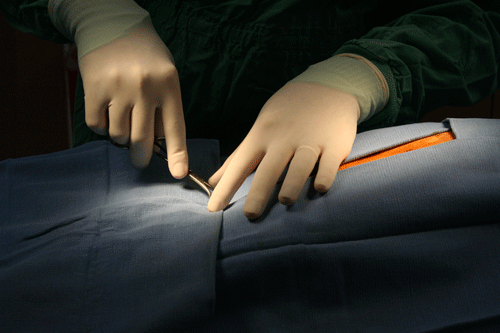Tissue damage has been implicated as a possible trigger in the development of various cancers. Until now, little was known about how local wounding, following cancer surgery, biopsy collection or ulceration, might impact on disease progression. The study, led by researchers from the Universities of Bristol and Aarhus in Denmark and published in the EMBO Journal, investigated how inflammatory cells react to cancerous wounds.The team first used zebrafish larvae - a well-established translucent organism to study cancer cell biology - that were genetically modified to sporadically produce pre-cancerous cells in their skin. They found that their inflammatory cells, primarily a type called neutrophils, were rapidly diverted from wounds to the pre-cancerous cells and this led to increased growth at the pre-cancerous site.
Their results showed the process was dependent upon these inflammatory immune cells and was, at least in part, due to the release of a factor called prostaglandin-E2 derived from the immune cells promoting cancer cell growth, which is, interestingly, a key target of the anti-inflammatory action of aspirin. In an adult Zebrafish model of chronic wounding, they also showed that repeated wounding led to a greater incidence of local melanoma formation.
To extend these findings to cancer patients, clinical researchers at Aarhus University compared the inflammatory response in human melanoma samples that were either intact or had ‘ulcerated’ open wounds. They uncovered a strong correlation between neutrophil presence at sites of melanoma ulceration and cancer cell division, which, in turn, was associated with a poor prognostic outcome in those patients.
The findings have clear implications for clinicians involved in cancer surgery and biopsy collection, as the inflammatory response surrounding the surgery site may inadvertently support growth of any remaining cancer.
Professor Paul Martin, who led the project from Bristol’s Schools of Biochemistry and Physiology and Pharmacology, said: “All surgery and biopsy collections carry an element of risk and this study reveals a further potential risk for clinicians to consider. For the first time we can now watch the interplay between inflammatory cells visiting wounds and nearby cancer cells, and use this to determine why and how this occurs and how we might learn to prevent it.”
Dr Nicole Antonio, one of the study’s lead authors from Bristol’s School of Biochemistry, added: “There is a longstanding association between wound healing and cancer, with cancer often described as a ‘wound that does not heal’. Surgery is a key cancer therapy and is still the most effective method to treat human solid cancers that have not yet metastasized. However tissue damage has been previously linked to cancer development and progression. Therefore it is important that we understand the dynamic molecular mechanisms for this process and uncover how clinicians can minimise the risks for cancer patients.”
Dr Emma Smith, senior science information officer at Cancer Research UK, said: “Surgery plays a vital role in helping thousands of people survive cancer every year – whether it’s used to remove a tumour or take a small sample to help doctors understand a patient’s cancer. This study, mostly in zebrafish, suggests that the immune response caused by wounds may encourage cancer cells to grow, but there’s no proof yet that having surgery causes the same thing in patients. If the immune response triggered by surgery is linked to cancer growth, then understanding this relationship could lead to ways of blocking it.”
The study was funded by the Wellcome Trust, Cancer Research UK and the Biotechnology and Biological Sciences Research Council [BBSRC].
Paper
The wound inflammatory response exacerbates growth of pre-neoplastic cells and progression to cancer by Nicole Antonio et al in EMBO Journal. DOI of the article: 10.15252/embj.201490147
